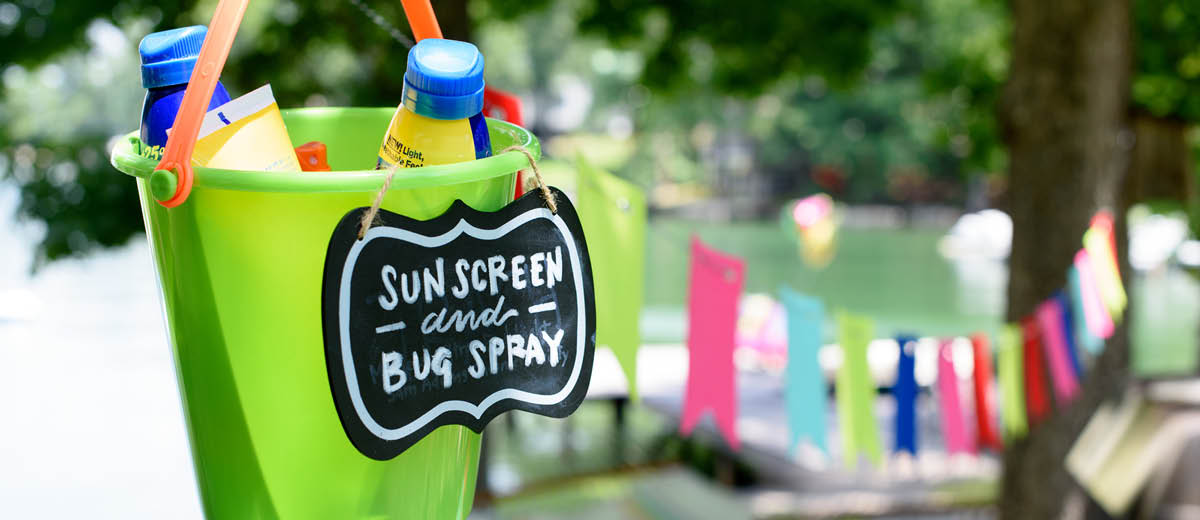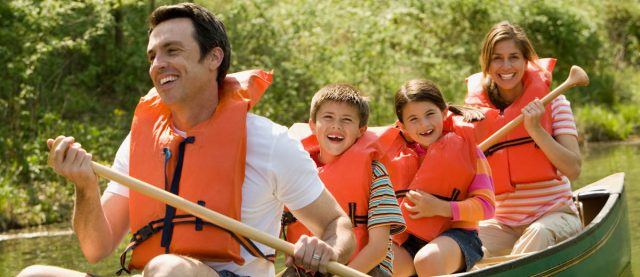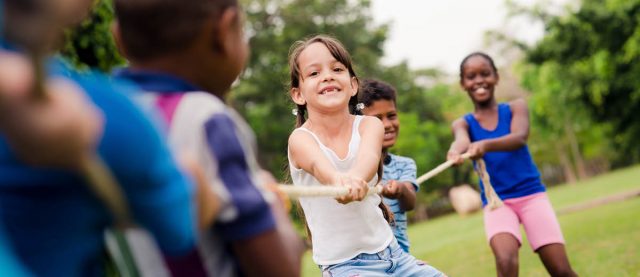
While summer brings with it the promise of enjoying beautiful long days in the sun and spending time on the water, there are important measures parents should keep in mind while enjoying outdoor summer activities with children. Among them: wear sunscreen and insect repellent as needed, drink plenty of water—especially on hot days— and take extra steps to keep kids safe while in the water or playing in the backyard.
To go beyond these basics, we sat down with Dr. Rachel Hildebrand, a pediatrician with North Memorial Health, to create a quick tip sheet for summer safety with kids.
1. Protecting children from the sun and heat
This summer has started with lots of sun and plenty of heat. When out in the sun, especially on a very hot day, there are practical ways to keep kids safe. Dr. Hildebrand says to keep the following in mind:
Limit sun exposure and wear a good sunscreen
First, infants under six months of age should be kept out of direct sunlight. Children of any age should wear breathable clothing, brimmed hats and sunglasses to limit the amount of sun-exposed skin.
A broad-spectrum sunscreen of SPF 15 or higher should be used on all exposed skin. When selecting a sunscreen, mineral sunscreens containing zinc oxide or titanium oxide are best, while sunscreens containing oxybenzone are not recommended for use on children, if possible, due to concerns about mild hormonal properties.
“Use plenty of sunscreen when applying. You should be able to see white cream and have to physically rub it in for a bit of time,” Dr. Hildebrand says, noting that it’s important to pay attention to the face, chest, shoulders and ears for coverage.
Know the warning signs of heat stroke/heat exhaustion
With more warm and sunny days in the summer forecast, Dr. Hildebrand offers the reminder that no matter what the temperature is never leave children unattended in parked vehicles. This is especially important in the summer heat as children are at higher risk of heat stroke, which can lead to death.
Signs of heat stroke include extreme disorientation, slurred speech, loss of consciousness and seizures. “If this happens, head immediately to the ER,” Dr. Hildebrand says.
Heat exhaustion should also be taken seriously. Signs of heat exhaustion include extra fatigue, weakness, goosebump, diarrhea, vomiting and fever. “If you children have any of these symptoms, seek advice from a doctor or go to an urgent care,” she says.
Always drink plenty of fluids
In addition, Dr. Hildebrand emphasizes that staying hydrated in the heat is very important. Everyone should drink plenty of water or sugar-free electrolyte drinks regularly.
“Encourage hydration, even when children are not thirsty,” she says.
2. Make water safety a family affair
 Drowning prevention is about much more than whether children can swim or not. Dr. Hildebrand says it is important for the entire family to demonstrate water safety around children.
Drowning prevention is about much more than whether children can swim or not. Dr. Hildebrand says it is important for the entire family to demonstrate water safety around children.
“Parents should demonstrate water safety so kids will follow their lead,” she says. “Parents should always be present when kids are around water. It’s a culture issue— not just knowing how to swim, but always making safe choices when near water.”
Practically speaking, that means never leaving children unattended near or in water. Ponds, wading pools and even buckets filled with water are all drowning hazards for very young children. Young children should always wear life jackets when playing in the water and everyone (adults and children) should wear life jackets while on boats or other flotation devices, as well as while swimming in lakes and rivers.
She also notes that children as young as age one may benefit from parent-toddler swim lessons. Once children reach age four, they may be ready for independent swim lessons.
“Promoting comfort in water and ability to get to the edge of the pool is lifesaving. Knowing when to call for help is lifesaving,” she says.
3. Preventing and managing bug bites
There’s a reason that there are a lot of jokes about the mosquito being Minnesota’s “state bird”.. Insects are a prevalent pest in Minnesota during the summer. Unfortunately, that means you and your children will likely end up with bug bites.
Dr. Hildebrand says to use insect repellents containing DEET on children older than two months of age to prevent insect-related diseases. When choosing a repellent, it’s helpful to know that while the amount of DEET varies, the effectiveness is the same for both. So, if there’s a lower amount of DEET, you’ll need to apply the repellent more frequently than a formula with a higher dose.
“A lot of common sense goes into protecting yourself from insect bites,” Dr. Hildebrand says. “Ticks are more prevalent in tall grasses and wooded areas, for example. Also, kids that are more mobile and can run through the grass are at a higher risk for getting bit than infants and small toddlers.”
It’s also important to try to help kids resist scratching, as that can lead to infection.
“Scratching can create a route of entry for bacteria,” Dr. Hildebrand explains.
She says infected bites will be red, painful and warm to the touch, and the area of redness will appear larger than a typical bite. Bites, while expected to be itchy, should not be tender. If they are tender and get larger over time, she says to start with some topical antibiotic ointment and check in with a doctor about a possible infection.
4. Practice good habits for backyard fun

Backyards and neighborhood gatherings can offer kids a great deal of fun throughout the summer. If kids want to jump on a bike, scooter or skateboard, Dr. Hildebrand says to make sure the kids always wear a helmet that meets CPSC safety standards.
Additionally, it’s best to keep small children out of the yard for their safety while a lawn mower is running. Dr. Hildebrand says due to safety concerns, children under age 16 should not operate a riding lawn mower, younger than 12 should not operate a walk-behind mower and parents shouldn’t have children riding as passengers on riding mowers in operation.
5. Prevent the “summer slump” by keeping minds and bodies active
 Parents with school-age children may worry about summer learning loss, especially following a year where many students were in distance learning settings. To combat boredom and encourage overall mental wellness, Dr. Hildebrand says it’s important that kids stay physically and mentally active. Day camp programs, reading program and visits to educational centers and museums are all great ways to keep kids minds sharp throughout the summer. She also notes that independent readers may enjoy a family book club.
Parents with school-age children may worry about summer learning loss, especially following a year where many students were in distance learning settings. To combat boredom and encourage overall mental wellness, Dr. Hildebrand says it’s important that kids stay physically and mentally active. Day camp programs, reading program and visits to educational centers and museums are all great ways to keep kids minds sharp throughout the summer. She also notes that independent readers may enjoy a family book club.
Special note: Navigating COVID-19 safety precautions
Dr. Hildebrand also notes that as COVID-19 vaccines are currently only available for children ages 12 and older, it is important for families to decide on their comfort level.
She says when meeting with patients, she encourages all families to have anyone ages two and up who are unvaccinated to continue to wear a mask while indoors until the 70 percent public health vaccine threshold is reached.
Related, she calls out that summer is an important time to make sure kids are up to date on all their routine childhood vaccinations before the next school year.
“There’s a lot to navigate for families right now,” she says. “I’m encouraging each family I meet with to make choices based on their preferences and comfort levels.”
Parents seeking more health tips like those that Dr. Hildebrand provided are encouraged to visit the American Academy of Pediatrics for an extensive summary for all of the above topics.

